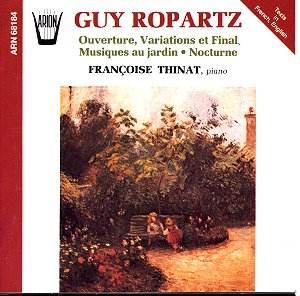The accompanying essay is an excellent example of how to elucidate, educate and entertain the listener. Written in French and translated generally very well into English. The life of the composer is set out and some gentle analytical comment on each work is offered. There are two excellent photographs of the composer one taken in 1891 and one I think from c.1950. We learn that Ropartz first studied law, but as soon as possible turned to music. He was a pupil of such diverse figure as Théodore Dubois, Massenet and Franck, and was director of the Nancy music conservatoire as early as 1894. He was there for 25 years carrying out no doubt tedious administrative duties as well as teaching. He retired to Brittany aged 55 to compose for the rest of his long life. He completed five symphonies, two operas, chamber works including six quartets, and much choral music a good collection of which can be found on Marco Polo (8.223774) including his magnificent setting of Psalm 136.
There are a few solecisms of note in the booklet translation. I can't help quoting this gobbledegook. Commenting on Ropartz's 'pessimistic' soundworld we read "At this point the modulatory stretching opposes, in a polytonal manicheism the vigour and the frankness of the new promise of perenniality, inherited from Gregorian cantina or modal rondes". However, this impenetrable observation is not the rule and one can learn much from the extensive essay. Of cause you can learn much more by simply listening to this beautifully crafted and passionate music.
French composers c.1900 were not all impressionists. Three styles can be seen:-
- Those whose interests lay in folk inspiration, composers like Maurice Emmanuel (1862-1938) - listen to the 2nd Symphony subtitled "Bretonne", and Jacques Canteloube (1879-1957) who collected folk material.
- Those who followed Debussy and the so-called impressionists like André Caplet (1878-1925) - listen to his 'Septuor' - and, arguably, Maurice Ravel (1875-1937).
- Composers who were the followers of César Franck including Vincent d'Indy and Albéric Magnard (1865-1914). Throughout his life Ropartz regarded Franck as his mentor. He was a close friend of Magnard a very strong Franckian, indeed one of the pieces from Musiques au Jardin (1915) 'Le Vieux souvenirs….' (Old memories arising in the shadows) uncannily recalls the style of Magnard's Promenades for solo piano. (Magnard had died when the Germans had burned down his house during their advance on Paris).
Franck of course had been a devotee of Wagner and was often concerned with using cyclic forms and motivic development. Being interested in things German was fine in 1904, the time of the first piece of this CD, but by 1914-17 Frenchmen had to show more concern for their own land and for more nationalistic traits; hence, I suspect, the titles 'Nocturne' and 'Musiques au Jardin'. When thinking of Nocturnes, a Frenchman in 1914 might well bring to mind a composer not yet mentioned and, curiously, not mentioned in the booklet essay, namely Gabriel Fauré. Fauré's name immediately came to my mind as soon as the Nocturne started. There is even an occasional hint of Debussy in this music, but Fauré is also present in 'Le jardin au Crépuscule', number 5 of the six movements of 'Jardin'.
I have been enormously impressed before by the technical pianism of Françoise Thinat. I remember her playing some horrendously difficult Barraqué on the radio a number of years ago; she has also recorded Schumann successfully. Ropartz is also difficult; he demands subtlety (especially of the pedal) and stamina, power and delicacy, dexterity and simple chordal balance between the hands. She captures the mood of each piece and is technically on top of everything. This is not obvious and I have not had access to any scores but the slightly boxy recording is good enough to allow these points to be heard.
If you enjoy music which seems to be surrounded by a Celtic
dream then Ropartz may be your man. But there is more to his music.
There is a clarity of form and expression displaying an insatiable curiosity
about all styles and languages, and although this CD is only the tip
of a vast iceberg, it is certainly an iceberg worth investigating.
Gary Higginson

![]() Françoise Thinat
(piano)
Françoise Thinat
(piano) ![]() ARION ARN 68184 [53.42]
ARION ARN 68184 [53.42]